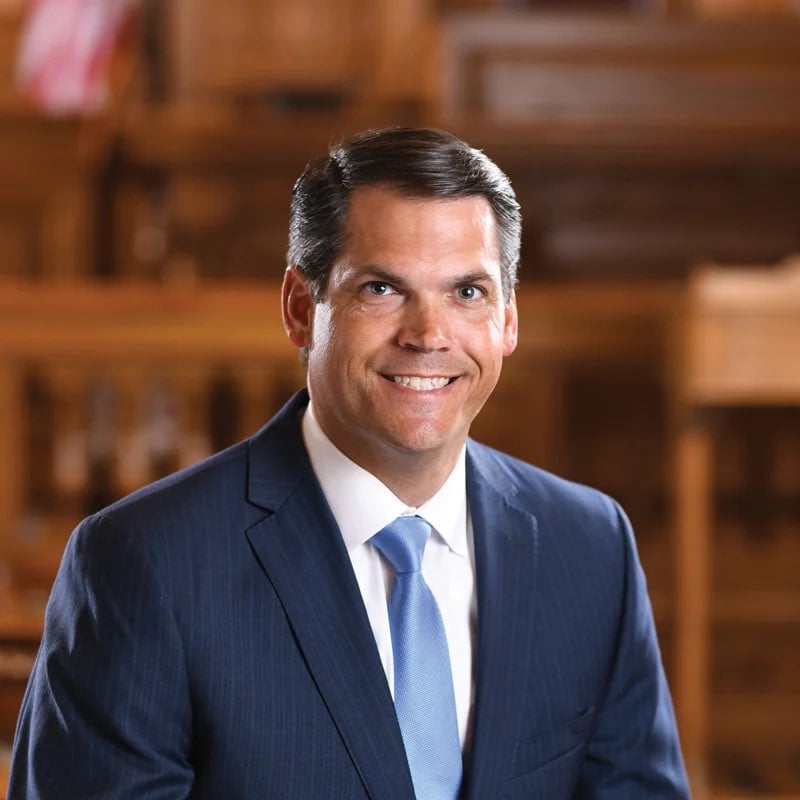Tuesday, May 7,2024. Annette’s News Roundup.
I think the Roundup makes people feel not so alone.
To read an article excerpted in this Roundup, click on its blue title. Each “blue” article is hyperlinked so you can read the whole article.
Please feel free to share.
Invite at least one other person to subscribe today! Here 👇 is the link to share for others to subscribe. https://buttondown.email/AnnettesNewsRoundup
Remember: when you share the Roundup, you are fighting Fascism and helping to bring about a Democratic victory in 2024.
_________________________________________________
Joe is always busy.
This Holocaust Remembrance Day, we mourn the six million Jews who were killed by the Nazis during one of the darkest chapters in human history.
— President Biden (@POTUS) May 6, 2024
And we recommit to heeding the lessons of the Shoah and realizing the responsibility of “Never Again.”
This Holocaust Remembrance Day, at a time of rising antisemitism, let’s remember who the Republican nominee is.
— Biden-Harris HQ (@BidenHQ) May 6, 2024
Here is a thread of Donald Trump’s long history of praising antisemites, hanging out with antisemites, and other antisemitic behavior.
🧵 pic.twitter.com/bb8yVl4Lzi
Biden speaks to Netanyahu as Israeli invasion of Rafah looms.
President Biden and Israeli Prime Minister Benjamin Netanyahu spoke on the phone for 30 minutes Monday, discussing hostage deal negotiations and Israel's preparations for a ground invasion of Rafah, U.S. and Israeli officials said.
Why it matters: Biden is seeking to salvage the long-stalled Israel-Hamas hostage deal and avoid a massive Israeli military operation in Rafah, where more than one million Palestinians are taking shelter.
Driving the news: Ahead of a possible ground invasion, Israel on Monday started to evacuate Palestinian civilians from the eastern parts of Rafah close to the Israel border, the Israel Defense Forces said.
The decision to begin evacuating Palestinian civilians was taken after talks between the Hamas delegation and Egyptian and Qatari mediators in Cairo ended with no breakthrough.
The White House said Netanyahu agreed to reopen the Kerem Shalom crossing between Israel and Gaza, which was shut down on Sunday after a Hamas attack on a nearby IDF outpost killed four soldiers.
Kerem Shalom is the main crossing between Israel and Gaza for aid trucks. (Axios).
_________________________________________________
Kamala is always busy.
On Holocaust Remembrance Day, we honor the memory of six million Jews who were murdered by the Nazis in one of the worst atrocities in human history.
— Vice President Kamala Harris (@VP) May 6, 2024
This pain, suffering, and evil must always be remembered and taught to ensure "Never Again." pic.twitter.com/HpRLXiIYVB
_________________________________________________
More on Yom HaShoah, Holocaust Remembrance Day. Yesterday.

On Yom HaShoah, Holocaust Remembrance Day:
— Chuck Schumer (@SenSchumer) May 6, 2024
We remember the 6 million Jewish victims and other victims of the Holocaust, murdered by the Nazis.
We stand up to antisemitism, bigotry, hate.
We stand with the Holocaust survivors who are raising their voices today to #CancelHate.
Governor Josh Shapiro of Pennsylvania.👇
This Yom HaShoah, I'm with community leaders, elected officials, and family members of Holocaust survivors to mourn the six million Jews who were murdered during the Holocaust — and to continue our responsibility to combat hate and ensure we never forget. https://t.co/3UrnodFiv7
— Governor Josh Shapiro (@GovernorShapiro) May 6, 2024
At Yom HaShoah and always, we remember the victims of the Holocaust. We share with you the story of Yehuda Bacon, whose art is a testimony to survival, and a witness: https://t.co/sCf4LR1qTy#HolocaustRemembrance pic.twitter.com/zVJyXwrDYs
— United Nations Outreach Programme on the Holocaust (@UNHOP) May 5, 2024
Several thousand Jews, including Holocaust survivors personally affected by the Oct. 7 Hamas attacks on Israel, walked through Auschwitz, the former Nazi German death camp, for the annual March of the Living ceremony in Poland. 👇
_________________________________________________
Today’s best anti-Trump posts for you to share.
Caroline Kennedy Schlossberg’s JFK-look-alike Son mocks RFK, Jr.
A Must-Watch. Touch to watch 👇. Share.
JFK's Grandson, Jack Schlossberg, is on Instagram triggering RFK Jr’s fan base — in a series of 5 separate posts, he criticizes @RobertKennedyJr by dropping truth-bombs in character.
— Christopher Webb (@cwebbonline) May 5, 2024
"He's a prick, he's lying to you."
————@JBKSchlossberg previously called RFK Jr.'s candidacy… pic.twitter.com/FzmfW0xRFV
Another outspoken anti-Trumper, Bob Costas.
Touch to watch 👇. Share.
Bob Costas on Trump: "He is by far the most disgraceful figure in modern presidential history.
— The Intellectualist (@highbrow_nobrow) May 4, 2024
You have to be in a toxic cult to believe that Trump has ever been emotionally, psychologically, intellectually, or ethically fit to be POTUS."
pic.twitter.com/LjhnSpZL4p


One more thing. On the positive side.
President Obama summarizes President Biden’s record. Touch here.👇
President @BarackObama is right 🔥 pic.twitter.com/96jD3An3Ps
— The Democrats (@TheDemocrats) May 6, 2024

_________________________________________________
Trump guilty of criminal contempt again in New York election manipulation case.
Judge Merchan holds Trump in contempt of court for violating his gag order — again.

The judge overseeing Donald J. Trump’s criminal trial in Manhattan rebuked the former president on Monday for mounting “a direct attack on the rule of law,” holding him in contempt of court for a second time and threatening to jail him if he continued to break a gag order that bars him from attacking jurors.
In a moment of remarkable courtroom drama, the judge, Justice Juan M. Merchan, addressed Mr. Trump personally from the bench, saying that if there were further violations, he might bypass financial penalties and place the former president behind bars.
Justice Merchan acknowledged that jailing Mr. Trump was “the last thing” he wanted to do, but explained that it was his responsibility to “protect the dignity of the justice system.”
The judge said that he understood “the magnitude of such a decision” and that jailing Mr. Trump would only be taken be as a last resort. He noted: “You are the former president of the United States and possibly the next president as well.”
As the judge delivered his admonition and imposed a $1,000 fine, Mr. Trump stared straight at him, blinking but not reacting, and when the remarks were over, the former president shook his head.
It was the second time in two weeks that Mr. Trump had been punished for breaking the gag order, which also prevents attacks on prosecutors, witnesses and others. Of all the violations Mr. Trump has been accused of, Justice Merchan has taken those involving the jury most seriously.
The violation for which the former president was punished on Monday stemmed from an incident on April 22, when Mr. Trump made disparaging remarks about the jurors during a telephone interview with a far-right media outlet, Real America’s Voice. The jury, he said, had been picked “so fast” and was “mostly all Democrat,” adding, “It’s a very unfair situation.”
Prosecutors from the Manhattan district attorney’s office, which brought the case accusing Mr. Trump of falsifying records to cover up a sex scandal, argued that Mr. Trump had committed a total of four new violations of the order. But Justice Merchan concluded that only the incident in which Mr. Trump attacked the jury amounted to a violation.
“Defendant not only called into question the integrity, and therefore the legitimacy of these proceedings, but again raised the specter of fear for the safety of the jurors and of their loved ones,” Justice Merchan wrote in his order holding Mr. Trump in contempt.
The order came less than a week after Justice Merchan issued a separate decision fining Mr. Trump $9,000 for nine earlier violations. In that ruling, the judge said that he lacked the authority to issue larger fines against the billionaire former president and warned him that continued disobedience could land him in jail.
The two contempt findings were the latest reminder of the great lengths to which judges have gone to keep Mr. Trump from lashing out at participants in the wide array of legal matters in which he is embroiled.
Last year, another judge in Manhattan twice found Mr. Trump in contempt during a civil fraud trial and imposed tens of thousands of dollars in fines. The former president is also under a gag order in a federal case in Washington in which he has been charged with plotting to overturn the 2020 election, but he has not yet been accused of violating that one.
Mr. Trump has bridled in various ways at the constraints of Justice Merchan’s order, which was first put in place in March and then expanded several days later.
On Thursday, for instance, one of his lawyers, Susan Necheles, asked Justice Merchan to evaluate a stack of articles that Mr. Trump had wanted to post online about the case.
Ms. Necheles expressed concern that the articles might violate the gag order because they mention the names of witnesses, but Justice Merchan refused to rule in advance about whether Mr. Trump could post them, cautioning Ms. Necheles, “When in doubt, steer clear.”
That same afternoon, when court let out for the day, Mr. Trump falsely told reporters that the gag order would prevent him from testifying in his own defense at the trial. On Friday morning, Justice Merchan took a moment to publicly correct the former president, instructing him that order “does not prevent you from testifying in any way.” (New York Times)
_________________________________________________
Trump’s alternate view of the universe.
Trump likens the Biden administration to the 'Gestapo' at a private donor event.

Trump spoke to donors at a closed-door retreat at Mar-a-Lago on Saturday.
Trump referred to the Nazi secret police as he was railing against the legal troubles he and his supporters face.
PALM BEACH, Fla. — Donald Trump compared President Joe Biden’s administration to the secret police force of Nazi Germany in remarks at a private, closed-door donor retreat on Saturday afternoon.
The former president’s comments came as he was talking about his legal troubles, attacking the prosecutors in the cases and bemoaning the recent indictments in Arizona of several of his former top aides, along with 11 so-called fake electors from the 2020 election.
“These people are running a Gestapo administration,” Trump said, according to audio of the luncheon provided to NBC News. “And it’s the only thing they have. And it’s the only way they’re going to win in their opinion.”
“Once I got indicted, I said, well, now the gloves have to come off,” Trump added, saying Biden is “the worst president in the history of our country. He’s grossly incompetent. He’s crooked as hell. He’s the Manchurian candidate."
Among the featured guests at the retreat this weekend are a number of potential vice presidential candidates, including Sen. Tim Scott of South Carolina, Rep. Elise Stefanik of New York, North Dakota Gov. Doug Burgum, Sen. JD Vance of Ohio, Sen. Marco Rubio of Florida, Rep. Byron Donalds of Florida and South Dakota Gov. Kristi Noem.
At the luncheon, Trump brought all these guests onstage — except Noem, who left early, according to two people in attendance — along with a number of other elected officials, including House Speaker Mike Johnson, R-La.
Trump also said he’d allow anyone who donated $1 million on the spot to come up to the stage. Two people took him up on the offer, including one woman who declared: “Donald J. Trump is the person that God has chosen.”(NBC News)
Trump "Gestapo" remarks: White House says Trump echoes fascists.
The White House denounced former President Trump Sunday over reports that he compared President Biden's administration to the Gestapo, the Nazi-era secret police force in Germany.
The big picture: The New York Times first reported that Trump made the comments after criticizing indictments against him at a private donor event in Florida Saturday, days after a New York judge found him in contempt for violating a gag order in his hush money trial.
"These people are running a Gestapo administration," Trump said, according to audio obtained by the NYT. "And it's the only thing they have. And it's the only way they're going to win, in their opinion, and it's actually killing them. But it doesn't bother me."
The latest: Jewish Council for Public Affairs CEO Amy Spitalnick said in a Sunday statement that it's "always wrong, offensive, and despicable to make comparisons like this," per Reuters.
Even more so "when taken alongside the former president's long history of normalizing antisemitism," Spitalnick added.
"[It's] especially heinous to use Nazi comparisons in the service of a bigoted, authoritarian agenda."
What they're saying: The White House responded to Trump's comments with a scathing statement that drew on the presumptive Republican nominee's past conduct and rhetoric — including his repeated comments that undocumented immigrants are "poisoning the blood of our country," language echoing the rhetoric of Adolf Hitler and other white supremacists:
"Instead of echoing the appalling rhetoric of fascists, lunching with Neo Nazis, and fanning debunked conspiracy theories that have cost brave police officer their lives, President Biden is bringing the American people together around our shared democratic values and the rule of law — an approach that has delivered the biggest violent crime reduction in 50 years."
— White House spokesperson Andrew Bates
The other side: North Dakota Gov. Doug Burgum (R), one of several potential Trump vice presidential picks who attended the fundraising event, told CNNSunday that Trump's "Gestapo" remarks were not "central to what he was talking about" and claimed "a majority of Americans feel like the trial that he's in right now is politically motivated."
Representatives for Trump did not immediately respond to Axios' requests for comment.
Go deeper: Trump's remarks on U.S. Jews spark antisemitism accusations (Axios).
_________________________________________________
Yesterday was a very sad day in New York.
After Weeks of Protests, Columbia Cancels Main Commencement Ceremony.
Columbia’s president had earlier said that she did not want to deprive students of an in-person celebration after many graduated high school during the pandemic.

After weeks of student protests, Columbia University announced Monday that it would be canceling its main commencement ceremony, and holding smaller ceremonies for each of its 19 colleges, mostly at its athletics complex some 100 blocks north.
The university’s main campus has been in a state of near lockdown since last Tuesday, when hundreds of police officers swarmed Hamilton Hall to remove some 46 pro-Palestinian protesters who had occupied the building and arrested more than 100 people protesting in and around the campus.
Dozens of police officers are still on and around campus, leaving questions as to how some 15,000 graduates and their guests could easily be admitted to the area around it for the May 15 commencement.
Nemat [Minouche] Shafik, Columbia’s president, had previously cited her desire to host the graduation on campus as one of the key reasons that she called in the police on April 30 to remove both the occupiers from Hamilton Hall and the large tent encampment that had taken over a central lawn for two weeks.
But on Monday, Columbia officials explained that security was one of the main reasons for canceling.
“We have decided to make the centerpiece of our Commencement activities our class days and school-level ceremonies, where students are honored individually alongside their peers, rather than the University-wide ceremony,” the university wrote in a statement.
The school said that it was still considering holding a “festive event on May 15” instead of the main ceremony, and that it would follow up with more details. The celebrations for the different colleges will begin on Friday and run through May 16.
“Holding a large commencement ceremony on our campus presented security concerns that unfortunately proved insurmountable,” Ben Chang, a university spokesman, said. He added that the school had made extensive efforts to identify an alternative venue and was unable to locate one that could host such a large event. “Like our students, we are deeply disappointed with this outcome.”
The main campus quad has become an emotionally charged site as the location of the protest encampment and arrests. The 21-acre football and other playing fields at 218th Street in Inwood, known as the Baker Athletics Complex, is more neutral ground.
But the decision was also about capacity. In its announcement, the school said that rather than divide its resources to keep both the school-level events and the main commencement ceremony safe, it would instead focus “on those school ceremonies and on keeping them safe, respectful, and running smoothly.”
Parents from around the world will be flying in to celebrate commencement with their graduates, which include those completing the undergraduate college, law school, medical school and many other degree programs.
Many of this year’s graduating seniors, officials had pointed out, also had their high school graduations canceled because of Covid-19 precautions, and many had started their college experience in remote learning.
“We also do not want to deprive thousands of students and their families and friends of a graduation celebration” Dr. Shafik said last week. “Many of them are the first in their families to earn a university degree. We owe it to all of our graduates and their loved ones to honor their achievement.”
At other universities around the nation where protests have broken out, administrators have also canceled or altered commencement events, out of concern over renewed protests.
Typically at the end of the school year, the heart of Columbia’s Morningside Heights campus becomes a sweeping venue with bleacher seating and thousands of graduates arrayed around the steps of Low Library. The university president takes center stage, officially conferring the degrees on the graduates from the school’s different colleges.
Two weeks ago, the University released a video of several graduates in their blue-and-white robes, explaining how important an in-person ceremony was to them.
But the way the administration has handled its pro-Palestinian demonstrators, including by calling in police to crack down and make more than 200 arrests on two separate days, has proved to be deeply unpopular with many students and faculty. Officials also became concerned that an event meant to unite the campus would divide it further.
The commencement decision also caused anger, however, including from some of the Jewish students who had felt most targeted by the protests.
“For the last three-plus weeks, I’ve had to listen as students on campus and protesters off campus shout for Zionists to get out of Columbia,” said Josie Toubin, the co-president of an organization of Jewish students at Columbia’s business school. “I am a Zionist, so they are yelling for me to leave.”
“Moving graduation is another action that punishes Jewish students without justification,” she said, adding that the main campus has been cleared of protesters so graduation should be held there. “Don’t isolate us to a site 100 blocks north of campus as a response to the unrest on campus.”
Tazia Mohammad, a freshman living on Columbia’s campus, was also upset, particularly with the ongoing police presence.
“It’s hypocritical to say you’re acting for the graduating class and then cancel their commencement,” she said of the crackdowns Dr. Shafik authorized. “It’s just silly.”
Khepera Lyons-Clark, 22, a senior at Barnard College, which is affiliated with Columbia University and normally participates in its main commencement ceremony, said the decision to cancel commencement seems to have demoralized students more.
“I just don’t understand what the motive is,” she said.
On Monday, Gov. Kathy Hochul criticized Columbia’s decision to cancel its main graduation ceremony. The governor said she had offered her support in devising security plans for the upcoming ceremonies at all New York colleges.
“One thing I did not want to do is have the lives and the families and all the young people who’ve worked so hard disrupted,” Ms. Hochul said during remarks at the Milken Institute Global Conference in Los Angeles. “I wanted them to have the benefit of walking across the stage. They earned it.”
The governor added that she had spoken to leaders at N.Y.U., Cornell University, City College and the State University of New York on Monday morning and those schools all confirmed they would proceed with graduation ceremonies as planned. (New York Times).
_________________________________________________
From Antonia Brico till now, not much has changed for women who conduct orchestras.
Can Marin Alsop Shatter Another Glass Ceiling?

The conductor Marin Alsop, seen here during the curtain call for John Adams’s “El Niño” at the Metropolitan Opera, has ambitions to lead another American orchestra.
Alsop has had enviable success, and was the first female conductor to lead a top American orchestra. She wants to take another step up.
Marin Alsop’s conducting students were taking turns on the podium recently in a rehearsal room at Meyerhoff Symphony Hall in Baltimore. They waved their batons in front of an imaginary orchestra, practicing Stravinsky’s notoriously complex “The Rite of Spring.”
Some conductors teach in poetry: what a piece means, how a certain sound should feel. Alsop, who spent untold hours at Meyerhoff Hall during her 14 years as music director of the Baltimore Symphony Orchestra, a tenure that ended in 2021, teaches in technical, tangible details.
In a measure with 11 beats, she suggested using the last as a pickup to the following bar, to give the players an extra bit of clarity. She flagged trouble spots: a transition that was “usually too loud, too fast, too soon,” and a moment when the winds tend to come in just after the strings, rather than in unison.
“You’re not accompanying,” she told a rising maestro who seemed to be giving an invisible musician too much leeway. “You’re in charge.”
At 67, Alsop is, in many ways, in charge. Last month, she made her debut at the Metropolitan Opera, conducting a new production of John Adams’s “El Niño.” Next season, she will lead the Berlin Philharmonic, perhaps the world’s pre-eminent orchestra, for the first time.
She recently recorded Mahler’s Ninth Symphony with her ORF Vienna Radio Symphony Orchestra at the storied Musikverein, an experience that brought Leonard Bernstein, one of her mentors, to mind.
“I’m standing there thinking, ‘I’m recording Mahler Nine where Lenny stood, where Mahler stood,’” she said backstage after a rehearsal in Baltimore. “It doesn’t get better than that.”
And yet something is missing as Alsop looks toward the next chapter of her already groundbreaking career: another American orchestra. When she became the Baltimore Symphony’s music director, in 2007, she was the first woman to lead one of the country’s 25 largest orchestras. (There is still only one woman in that group: Nathalie Stutzmann at the Atlanta Symphony.)
Alsop hoped she would continue her steady rise and take on one of the handful of the most venerable, resource-rich American ensembles, like the Chicago Symphony Orchestra or the New York or Los Angeles philharmonics. Though nothing has worked out, she is still hungry for another chance at a directorship.
“I love guesting,” she said. “But really, it pales for me in comparison with being able to build something in a community. That’s really what I love.”
At a time when orchestras are eager to connect with a broader swath of their communities, Alsop’s struggle to score a position at the very top of the field attests to the persistent lack of both Americans and women on the country’s most prestigious podiums.
“To me, it’s a great pity,” said David Foster, Alsop’s longtime manager, now president emeritus of Opus 3 Artists. “Because she’s about as qualified to be a music director in North America in the early years of the 21st century as just about anyone on earth.”
Born in 1956 to two professional string players in New York, Alsop quickly embraced the violin. But when she was still a child, her father took her to one of Bernstein’s Young People’s Concerts at the New York Philharmonic, and conducting became her dream.
It was, from the beginning, a tough road for a woman: Alsop earned two violin degrees from the Juilliard School, but was rejected three times by the school’s conducting program. She had to form her own groups — String Fever, a small ensemble that did arrangements of swing numbers, and Concordia, which branched into jazz crossover — to get podium experience.
But Bernstein’s mentorship in the late 1980s helped as she began to get hired at small orchestras in the 1990s. Her long-term leadership of the Cabrillo Festival of Contemporary Music in California burnished her new-music credentials. In 2002, she founded a fellowship program for female conductors, which has flourished. (That is one of several details of her life borrowed, without her knowledge or permission, for Cate Blanchett’s toxically imperious maestro character in the 2022 film “Tár.”)
In Baltimore, the beginning of her tenure was rocky, with some players criticizing her as a lightweight whose appointment had been forced on them by the orchestra’s administration — a reaction that might have had something to do with her being a woman, and a lesbian.

Alsop with her partner of 26 years, the horn player Kristin Jurkscheit.
But she stood her ground and won the musicians over. When she returns to the city now, it’s as a conquering, grinning hero. A few weeks ago, some in the crowd stood and cheered when she entered at the beginning of a concert.
At the end, when she casually walked onstage to grab her score off the podium as the audience was leaving, it set off another wave of applause. Speaking to the audience before Ives’s Second Symphony, as she and the players gave glimpses of some of the old American tunes folded into the piece’s textures, she was charming, amusing, intelligent.
She founded OrchKids, a music education program for disadvantaged Baltimore children that has continued to be one of the field’s most inspiring success stories. She still teaches at the Peabody Institute, part of Johns Hopkins University, and she and her partner, Kristin Jurkscheit, still live in the city. Members of the Baltimore Symphony use her parents’ instruments and bows, which she donated to the orchestra after they died; the piano that accompanied her students in their “Rite of Spring” session was once owned by her family.
“I really believe that orchestras are civic institutions,” she said. “To be relevant, the leader has to commit to the community in a way that is profound.”
No one could say that Alsop doesn’t commit in a profound way. In Baltimore, she did everything you’re supposed to do as a modern-day music director.
“She’s so driven,” said Deborah Borda, most recently the chief executive of the New York Philharmonic. “She’s so smart. She’s in the prime of her conducting life. I don’t have a crystal ball, but she is in the prime of her career.”

Alsop on the pedestal.
Yet that career turned a bit from America. Alsop has long had success in Britain, and has led the Last Night of the Proms, the widely televised culmination of the BBC’s signature summer festival, three times since 2013. Around then, she also got an orchestra in São Paulo. She added the Vienna Radio Symphony in 2019, and the Polish National Radio Symphony Orchestra is newly under her baton.
“Most of my efforts these days are in Europe,” she said, “and I find a different attitude among the orchestras there. I wouldn’t say it’s looseness, but there’s more flexibility.”
She has sometimes found American administrators less receptive to her ambitions for the institutions she’s part of. “I can be a lot because I have a lot of thoughts and I have a lot of ideas,” she said. “And ideas are sometimes interpreted as more work.”
“One of the reasons I took the position in Poland,” she added, “is that the woman who runs the orchestra and hall is brilliant. She’s a thinker, and we can sit down and talk about these ideas, and I love it.”
But some of those contracts abroad have been sunsetting, and it may be that the pendulum is swinging back toward this side of the Atlantic for her. At the Ravinia Festival, the Chicago Symphony’s summer home, where she became chief conductor and curator in 2020, she has the scope to conduct a broad range of music, as well as leading education and mentoring efforts.
“She’s got an uncanny ability to listen, and humility and adaptability,” said Jeffrey Haydon, the festival’s president and chief executive, adding that Alsop is blessedly free of the need to be the star of every event: “She’s always aware of whether it’s better for her to support the moment, or lead the moment, or be the moment. Many artists have to be the moment, and that’s it. She can do that — she has the gravitas and ability to do that — but that’s not her default.”
In January, the Philadelphia Orchestra announced that she would be its next principal guest conductor, taking over from Stutzmann. Alsop’s is a substantive position, both in Philadelphia and on tour, but it is a supporting role nevertheless.
As she searches for an American directorship, among the problems is that there simply aren’t very many open jobs at the level she is seeking. The Los Angeles Philharmonic, the San Francisco Symphony and the Cleveland Orchestra are about it at the moment.
“It would make perfect sense for her to have another orchestra,” said Foster, her old manager. “But there aren’t that many that would be appropriate. The air is thinner as you go higher.”
And while Alsop showed that it was possible to be a female music director of one of the country’s largest orchestras, she now faces another glass ceiling as a woman who is no longer young.
“There’s a lot more ageism for women,” she said. “So that’s one of my new flags: fighting for mature women, that they be given the same time and the same opportunities and the same consideration.”
There is also divergence in opinions about her music-making. Some observers and players find her solid but uninspired; some adore her. Foster said there were “loads” of jobs they had hoped for but didn’t get, and that selecting a music director is “partly based on chemistry.”
“What happens on the podium is what counts,” he added. “And there, I think that she is more relaxed and happier. Because she’s been conducting better and better orchestras more of the time, she’s prepared to let musicians play more. When you’re young and have a young orchestra, not everybody knows so much, so you have to conduct a lot. In that way, I think she’s become a better conductor.”
Alsop is prominent enough to be the subject of a documentary, “The Conductor,” that premiered at the Tribeca Film Festival in 2021. Yet orchestras and opera companies can be surprisingly siloed in terms of who they ask (and re-ask) to appear, and opinions formed decades ago can be persistent.
“It was my idea to ask her to do the Met,” John Adams said of the new production of his “El Niño.” “It’s funny: I don’t think Peter Gelb” — the company’s general manager — “would have thought of it, but the moment I mentioned it, he said, ‘Of course.’ Marin has so often not been on the radar, in part because she has such a humble, generous, even self-effacing personality, which is not the usual job description.”
Alsop said, with a laugh: “Every time Peter Gelb introduces me, it’s ‘Here’s Marin Alsop, making her long overdue debut.’ And it makes me feel like people think I’ve been on a boat on the ocean somewhere. I’ve been here, you know?”
“I hope I’ll have the platform to be able to really use my curiosity and my commitment, because I have a lot of that, to be helpful to another American orchestra,” she added. “I don’t know if it will happen. But I would love to do that, because that’s what I enjoy the most.”(New York Times).
Here 👇 is a second New York Times article on Marin Alsop (June 2021).
A Trailblazing Female Conductor Is Still Alone on the Trail.
_________________________________________________
2024 Pulitzer Prize
ProPublica, for the work of Joshua Kaplan, Justin Elliott, Brett Murphy, Alex Mierjeski and Kirsten Berg
Groundbreaking and ambitious reporting that pierced the thick wall of secrecy surrounding the Supreme Court to reveal how a small group of politically influential billionaires wooed justices with lavish gifts and travel, pushing the Court to adopt its first code of conduct.
Best-deserved Pulitzer ever! Bravo ProPublica for a remarkable effort. Proud of you.https://t.co/ZMIIA2Hz5N
— Sheldon Whitehouse (@SenWhitehouse) May 6, 2024
Here is a link to the full list.
_________________________________________________